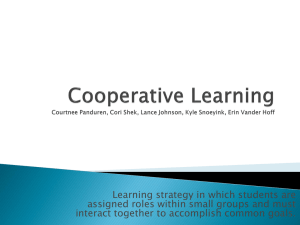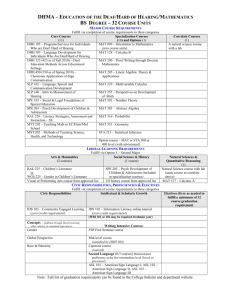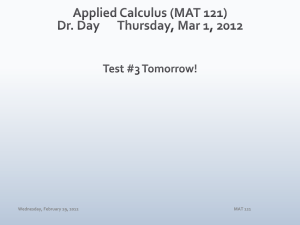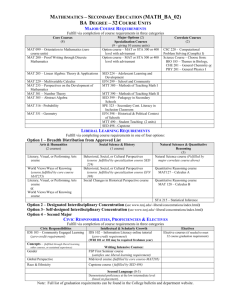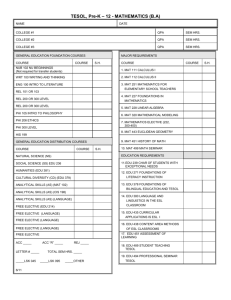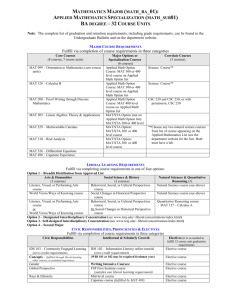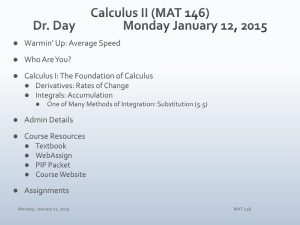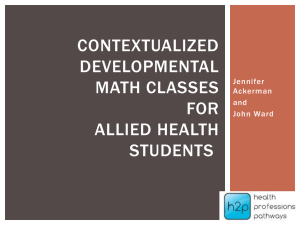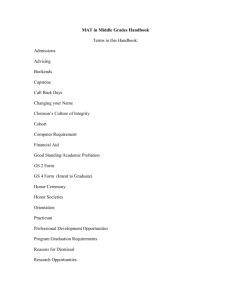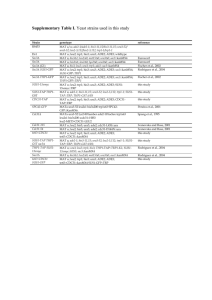ugcc9Oct06 - CBU - California Baptist University
advertisement
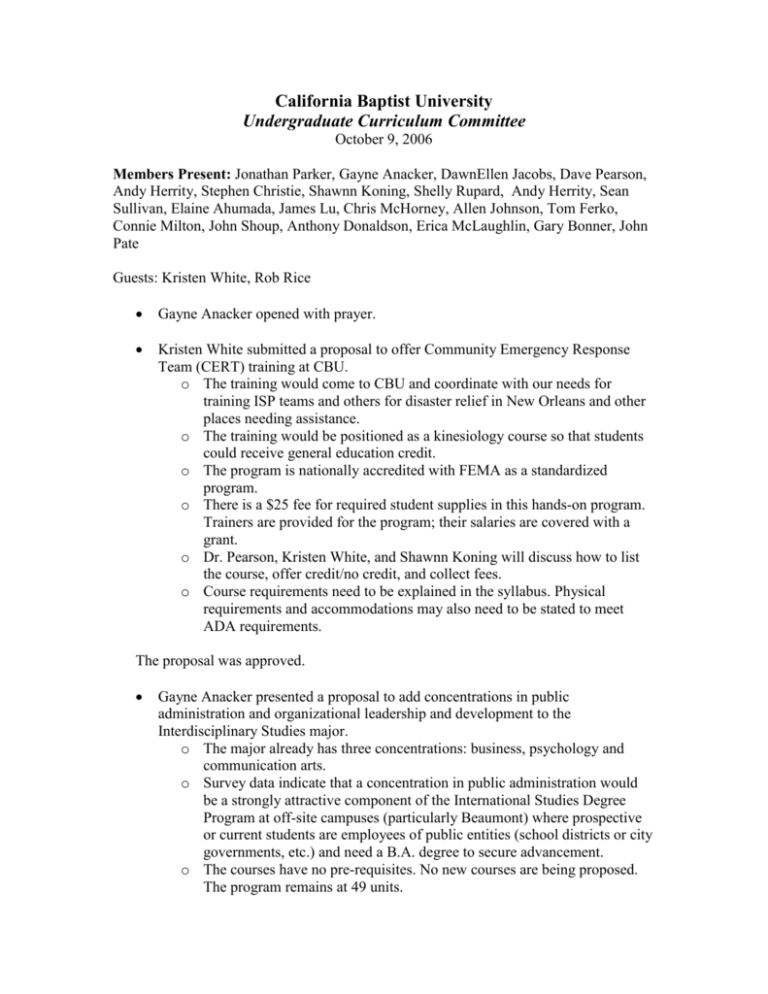
California Baptist University Undergraduate Curriculum Committee October 9, 2006 Members Present: Jonathan Parker, Gayne Anacker, DawnEllen Jacobs, Dave Pearson, Andy Herrity, Stephen Christie, Shawnn Koning, Shelly Rupard, Andy Herrity, Sean Sullivan, Elaine Ahumada, James Lu, Chris McHorney, Allen Johnson, Tom Ferko, Connie Milton, John Shoup, Anthony Donaldson, Erica McLaughlin, Gary Bonner, John Pate Guests: Kristen White, Rob Rice Gayne Anacker opened with prayer. Kristen White submitted a proposal to offer Community Emergency Response Team (CERT) training at CBU. o The training would come to CBU and coordinate with our needs for training ISP teams and others for disaster relief in New Orleans and other places needing assistance. o The training would be positioned as a kinesiology course so that students could receive general education credit. o The program is nationally accredited with FEMA as a standardized program. o There is a $25 fee for required student supplies in this hands-on program. Trainers are provided for the program; their salaries are covered with a grant. o Dr. Pearson, Kristen White, and Shawnn Koning will discuss how to list the course, offer credit/no credit, and collect fees. o Course requirements need to be explained in the syllabus. Physical requirements and accommodations may also need to be stated to meet ADA requirements. The proposal was approved. Gayne Anacker presented a proposal to add concentrations in public administration and organizational leadership and development to the Interdisciplinary Studies major. o The major already has three concentrations: business, psychology and communication arts. o Survey data indicate that a concentration in public administration would be a strongly attractive component of the International Studies Degree Program at off-site campuses (particularly Beaumont) where prospective or current students are employees of public entities (school districts or city governments, etc.) and need a B.A. degree to secure advancement. o The courses have no pre-requisites. No new courses are being proposed. The program remains at 49 units. o The courses would be grouped and sequenced as follows: Proposed concentration in public administration (all 12 units are required) POL 493: Principles of Public Administration (3) (E1) POL 451: Executive Leadership in the Public Sector (3) (E1) POL 491: Public Personnel Management (3) (E2) POL 465: Policy Process and Analysis (3) (E2) Proposed concentration in organizational (institutional) leadership and development (all 12 units are required) BUS343: Human Resource Management (3) BUS435: Leadership in Organizations (3) COM425: Organizational Communication (3) POL452: Organizational Theory and Design (3) o Elaine Ahumada will continue research to determine the most marketable title for the organization/institutional leadership concentration. The proposal was approved. Tom Ferko proposed a major and Single Subject Matter Program in foundational mathematics. o The program repackages existing courses to meet the state requirements for a credential for those who want to teach the majority of math courses offered in secondary math classrooms. Those classes include basic mathematics, algebra and geometry, but do not include calculus or AP courses. o Few institutions currently offer this foundational credential program, so there is an opportunity for CBU to capture a corner of the market not currently being well served and meet the tremendous need for qualified secondary math teachers in these basic math courses. o Students must complete one of the extended study options which are included as part of the degree program. The physics option would not allow students to teach physics in a secondary setting, but is an option required by CCTC. o At least half of current math majors are interested in teaching. o These Single Subject Matter Program requirements would be fulfilled by a student taking the following proposed major in foundational mathematics (53-57 units). Lower Division Requirements: Units MAT 125Mathematics Concepts&Applications I 3 MAT 127Mathematics Concepts&Applications II 3 MAT 135Pre-Calculus (or demonstrated proficiency) 0-3 MAT 245Analytical Geometry and Calculus I 4 MAT 245L Calculus Symbolic Language Lab I 1 MAT 255Analytical Geometry and Calculus II 4 MAT 245L Calculus Symbolic Language Lab II Upper Division Requirements: MAT 313Mathematical Proofs and Structures MAT 353 Probability and Statistics MAT 363History of Math.&Theory of Numbers MAT 403 Linear Algebra MAT 463Fundamental Concepts of Geometry MAT 499 Capstone ETC 305 Educational Computing EDU 300 American Pubic Schools EDU 302 Growth, Development and Learning EDU 315 Reading & Writing, Content Area Electives (must take all courses in Group A or Group B) Group A o MAT 343Multivariable Calculus o MAT 443 Advanced Calculus Group B o PHY 214 Physics-Scient&Engine I w/Lab o PHY 224 Physics-Scient&Engine II w/Lab The proposal was approved. 1 3 3 3 3 3 3 3 3 3 3 4 3 4 4 Dr. Ferko also proposed that the MAT 499 Capstone Project course be changed from 1 unit to variable 1 to 3 units. Expectations for the increased units in the Foundational Mathematics major are differentiated with the additional education courses required for inclusion in the portfolio. The proposal was approved. Chris McHorney proposed that CJS 351: Evidence and CJS 354: Computers for Law Enforcement be removed from the list of classes that a Criminal Justice minor can take in order to satisfy the upper division elective requirements. o Rationale: CJS 351 and CJS 354 are designed for students enrolled in the Active Duty Law Enforcement Program (i.e., a prerequisite of Police Academy Training). Thus, the Department of History, Political Science, and Criminal Justice does not offer this course for our Criminal Justice majors. The proposal was approved. Dr. McHorney also proposed that HIS 400 be removed from the catalogue since any topic taught in this category would fall under either HIS 401 Special Topics in US History or HIS 402 Special Topics in Non-US History. The proposal was approved. John Shoup presented a proposal to retire the 300 and 400 designations for the following optional courses in the undergraduate ESM/Liberal Studies major program. o The optional courses outlined below are written to the CCTC standards, hence there is not a differentiation in the course requirements for graduate and undergraduate students. o Retiring the 300/400 designations and using only the 500 level designation makes the courses eligible for post baccalaureate credit, assuming the requirements for the post baccalaureate credit are met as outlined on page 56 of the 06/07catalog. o The change will better serve the students advancing to graduate programs by having the courses outlined below designated as graduate level courses. EDU 405/505 Teaching Math and Science EDU 412/512 Teaching L.A. and Social Studies EDU 416/516 Teaching Reading and Phonics EDU 440/518 Classroom Management and Discipline EDU 497/514 Secondary Methods EDU 490/519 Content Specific Methods EDU 315/515 Reading & Writing in the Content Area EDU 450/500 Bilingual Issues and Methods o This change may have a different impact on students pursuing majors towards single subject credentials since it is possible for them to complete more of their credential courses at the undergraduate level as part of their baccalaureate unit requirement. The proposal was approved. ICRC will need to discuss the implications for students with regard to tuition and whether courses taken as proposed would be included in the 13-18 unit window. If not, the financial burden may outweigh the academic benefits for some students. Dr. Shoup proposed that for the non-credential Liberal Studies major the following degree requirements be amended as outlined below to include what is written in italics. o The courses in italics are required for the ESM/Liberal Studies Program. o ETC 305 Educational Technology and EDU 302 Growth, Development and Learning are commonly requested as academic variances and are approved on a regular basis. The updates would eliminate the need for students to complete the academic variance form. CIS 265 Information Systems or ETC 305 Educational Technology BUS 218 Macroeconomics or POL 395 Political Economy PSY 320 Life Span Development or EDU 302 Human Growth & Development The proposal was approved. The meeting was adjourned at 11:10 am. The next meeting of the Undergraduate Curriculum Committee is scheduled for Monday, November 13, 2006. Agenda items should be submitted to DawnEllen Jacobs no later than November 8 for distribution to members.

